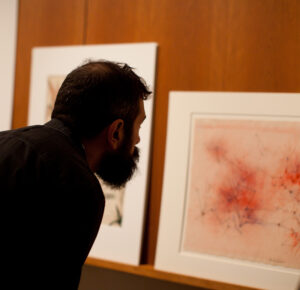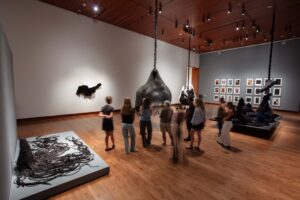Plan A Visit
Arrange a class, group, or research visit to the Chazen. The Museum’s galleries offer opportunities to engage with temporary exhibitions and hundreds of objects from the Chazen’s permanent collection. The Simon & Rosemary Chen Family Study Room for Works on Paper and Objects Study Room provide access to artworks when they are not on view for individuals or small groups.
Please note:
The museum’s galleries will be closed April 6–August 23, 2026, to reinstall the collection galleries and prepare for the reopening of the Elvehjem building. Booking requests for the study rooms will be accepted through May 10, 2026.
UNIVERSITY AND RESEARCH VISITS

The Chazen hosts hundreds of university class visits each year and regularly supports research projects with its collection. Museum staff are eager to collaborate by sharing resources, helping identify artwork related to curriculum, and co-developing lesson planning materials for the visit.
Please submit all requests (including self-guided bookings) at least three weeks prior to the requested appointment. We ask that self-guided visits fill out this form to ensure there will be adequate space and capacity in our galleries. Contact visit@chazen.wisc.edu with any questions.
K-12 AND COMMUNITY VISITS
 The Chazen offers custom, guided field trips and tours that encourage close looking and creativity for all ages. Museum staff can also provide class resources and teacher development information to support student learning even before a visit.
The Chazen offers custom, guided field trips and tours that encourage close looking and creativity for all ages. Museum staff can also provide class resources and teacher development information to support student learning even before a visit.
Please submit all requests (including self-guided bookings) at least three weeks prior to the requested date. We ask that self-guided visits fill out this form to ensure there will be adequate space and capacity in our galleries. Contact visit@chazen.wisc.edu with any questions.
Go Big Read!
 The Chazen Museum of Art invites UW–Madison instructors and members of the community to teach and consider the 2025-2026 Go Big Read, James by Percival Everett, through engagement with our collection. This teaching guide presents a selection of artworks with strong thematic ties to the novel, such as identity, empowerment, and narrative. Brief contextual statements and prompts for engagement highlight literary connections and support object-centered, interdisciplinary learning. Supplemental artworks and additional resources are provided at the end of the guide.
The Chazen Museum of Art invites UW–Madison instructors and members of the community to teach and consider the 2025-2026 Go Big Read, James by Percival Everett, through engagement with our collection. This teaching guide presents a selection of artworks with strong thematic ties to the novel, such as identity, empowerment, and narrative. Brief contextual statements and prompts for engagement highlight literary connections and support object-centered, interdisciplinary learning. Supplemental artworks and additional resources are provided at the end of the guide.
Lesson modules
The Chazen Museum of Art’s curatorial and education departments collaborated to design learning modules based on the museum’s collection for use in a variety of courses. These modules can be tailored by instructors to their purposes, the subject of their course, and their learning goals. Each module includes information about, and images of, a group of artworks drawn from the Chazen’s permanent collection pertinent to the theme. The modules include questions for consideration and discussion and a number of suggested assignments. Originally developed for UW–Madison’s Canvas platform, the resources are presented here for all teachers to access.
Each artwork is accompanied by a description of the artwork, the artist’s biography, context relating to the module theme, a list of related artworks in the permanent collection, links to related video content where available, and a bibliography of related readings.
For Faculty
For K-12 Teachers
The Art of Sustainability
What is sustainability? How do artists communicate sustainability in their practices? This module investigates how artists have examined the increasingly urgent and fraught topic of humankind’s complicated relationship with the environment. The topic of sustainability is complex and has many facets. The works shared here utilize sustainable materials, demonstrate a deep personal reflection of the and sense of place, or send a warning to future generations. Artworks from the Chazen Museum of Art’s collection included in this module address a variety of ecological issues including, but not limited to, scarcity of natural resources, pollution, natural disasters, environmental racism, and colonialism.
Activism through Art
What does activism look like? What does it mean to be an activist? This curriculum investigates ways artists have addressed topics of a political and social nature across time. Given their creativity and vision, artists can offer a unique vantage point. Their artworks can encourage viewers to think about the complexities of an issue rather than condensing it into a headline. Artworks from the Chazen Museum of Art’s collection included in this curriculum address a variety of social issues including, but not limited to, gun violence, racism, and poverty.
Resilience and Surviving Trauma
At some point in our lives, we have all experienced trauma. From our first skinned knee, to our first break up, to the loss of a loved one, no one is exempt. The COVID-19 pandemic and current civil unrest has awakened many of us to a new trauma—a collective kind that is ever-present in our daily lives. As difficult times continue to unfold, we must rely on resilience to persist. Defined in simplest terms as the ability to withstand adversity and recover from difficult life events, resilience is what gives us the physical and emotional strength to overcome hardship.
Activism through Art (grades 9–12)
These lesson plans investigate ways artists address political and social issues. By carefully examining three works of art from the Chazen’s collection, students will be able to consider what activism is and how it relates to them and their community. The artwork used in the curriculum ranges from photographs of schoolchildren exploring their use of language (Wendy Ewald) to a silhouette narrative examining our nation’s fraught history with racism (Kara Walker). The artwork is diverse in medium, subject, tone, and message. However, several universal themes are present.
The Art of Sustainability (grades 3–5)
Created for grades 3–5, this module investigates ways artists represented in the Chazen’s permanent collection address environmental sustainability and the complex relationship between humans and nature. By carefully examining artwork from the Chazen’s collection, students will be able to consider what sustainability is and how it relates to them and their community.